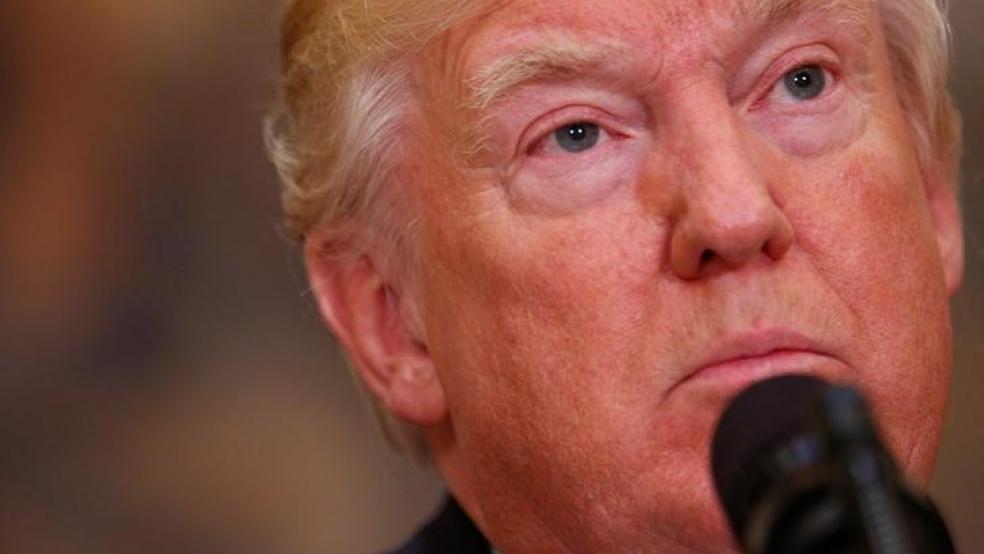The pattern, by now, has become so predictable that it practically qualifies as a law of nature. A respected person or institution challenges, crosses, or inconveniences Donald Trump, and as night follows day, the attacks begin. Whether spewed directly from Trump himself or, increasingly, from a small army of willing surrogates, they begin assiduously chipping away, not at the criticism itself, but at the idea that there even is such a thing as respectability, authority, or honesty.
This isn’t new, to be clear. Trump has spent the last two years attempting to undermine the public’s trust in any person who presented a threat or institution that looked like an obstacle.
Related: The US Dollar Takes a Hit as Doubts Grow About the Trump Agenda
When elections appeared unlikely to go his way, they were declared “rigged.”
When a federal judge seemed dubious about his defense of the Trump University scam, Trump attacked the Indiana-born jurist for being a “Mexican” who was biased against him because of his anti-immigration positions.
When US intelligence agencies reported that they had overwhelming evidence that the Russian government interfered in last year’s election with the express aim of hurting Hillary Clinton and helping Trump, he tried to drag their reputation down into the mud as well. Seemingly at random he described them sometimes as grossly incompetent, and at others as the masterminds of a “deep state” plot against him.
It’s important to list these things, because in the chaotic day-to-day flow of news and information, we sometimes treat specific incidents as isolated from broader patterns, which can give them more credibility in the moment than they deserve.
Related: Why Trump Can’t Sell Health Care Reform – and the Price He’ll Pay for It
Take, for example, the ongoing effort by Trump and his inner circle to discredit Robert Mueller, the former director of the Federal Bureau of Investigation who was named special counsel in charge of investigating the possible connections between Trump’s presidential campaign and Russian intelligence officials.
Mueller’s career of public service is long and distinguished. A legitimate war hero who served as a Marine in Vietnam, he excelled in a career in law enforcement capped by a 12-year stint at the helm of the FBI. He was appointed to that job by a Republican president and was asked to remain past the end of his 10-year-term by a Democrat.
It was Mueller’s reputation for probity and integrity that earned him the appointment as special counsel -- a selection made by another Trump appointee, no less. But now that his investigation appears to be gathering steam, Trump and a select crew of minions are working to discredit him.
In an interview with The New York Times last week, Trump suggested that Mueller was somehow biased against him because Trump had interviewed him for another stint as FBI director. “There are so many conflicts that everybody has,” he complained.
Related: Can Trump Raise the Dead? Senate to Vote One More Time to Repeal Obamacare
He then sent White House counselor Kellyanne Conway, a woman who has demonstrated a willingness to say practically anything in defense of Trump, to appear on Fox News and blast the team of veteran prosecutors that Mueller assembled as some sort of Democratic hit squad out to avenge former Democratic presidential nominee Hillary Clinton’s loss to Trump.
Or look at the ongoing attempt by the White House and, increasingly, its Congressional allies, to undermine public trust in the Congressional Budget Office because that agency’s analysts have not delivered favorable budget scores of Republican health reform bills.
The similarities to Mueller are notable. Just as Mueller is a Republican, appointed by another Republican appointee to lead a non-partisan effort, the CBO is a non-partisan agency currently led by a conservative Republican who was appointed by other Republicans.
CBO has a long and well-deserved reputation for integrity, regardless of who is running it. Conservative Republican Douglas Holtz-Eakin, while serving as CBO director from 2003 to 2005, angered Republican lawmakers when his agency presented an analysis finding that tax cuts do not pay for themselves. Democratic appointee Douglas Elmendorf angered officials in the Obama White House with critical analyses of the Affordable Care Act and of plans to increase the minimum wage.
Related: New Republican Plan to Repeal Obamacare Gets an Ugly Score From CBO
Its current Director, Keith Hall, who has served, among other positions, as chief Economist for the White House Council of Economic Advisers under George W. Bush, can’t be credibly accused of anti-conservative bias. But that hasn’t stopped the White House and now members of Congress from attacking his organization for just that.
White House Office of Management and Budget Director Mick Mulvaney has gone after the agency as biased and even unnecesary. On Friday, two ultra-conservative House members, North Carolina’s Mark Meadows and Ohio’s Jim Jordan, penned an op-ed in The Washington Examiner calling the agency “grossly ineffective” and suggesting that it willfully ignores “common-sense realities” in blind adherence to Keynesian economics.
This is terribly unfair to the leadership and staff at CBO, but unfortunately it is of a piece with the current tone in Trump’s Washington, where the the knee-jerk reaction, from the president on down, is to try to throw a cloud of doubt and suspicion over any person or institution that challenges the president, regardless of the long-term harm that might do to the country.





